Charleston Veterinary Referral Center (CVRC)

Neurology & Neurosurgery
Overview
The Neurology/Neurosurgery service diagnoses and treats diseases of the brain, spinal cord, nerves, and muscles.
Their goal is to provide both medical and surgical options for neurological conditions and to ensure the best quality of life for your pet.

What is a Veterinary Neurologist?
A board-certified veterinary neurologist has obtained intensive training in neurology and neurosurgery and has been certified by the American College of Veterinary Internal Medicine (DACVIM - Neurology). The advanced training and education required for this certification include an undergraduate degree, followed by 4 years of veterinary school, a 1-year rotating internship, a 3-year neurology/neurosurgery residency, and passing two sets of rigorous examinations covering all aspects of general internal medicine and neurology and neurosurgery.
What diseases does the Neurology service manage?
Seizure disorders
Intervertebral disc disease
Vestibular disease/ balance disorders
Brain, spinal cord, and peripheral nerve tumors
Neuromuscular diseases
Meningoencephalomyelitis (infectious and inflammatory diseases of the brain and spinal cord)
Discospondylitis
Traumatic brain injury
Caudal cervical spondylomyelopathy (Wobbler’s syndrome)
Lumbosacral disease
Spinal and skull fractures
Atlantoaxial subluxation
Congenital malformations of the central nervous system
What diagnostics does the Neurology service offer?
Detailed neurologic exam
Diagnostic Imaging
MRI
CT
Fluoroscopy
Digital radiography
Ultrasound
Cerebrospinal fluid (CSF) collection
Electrophysiology Testing: electromyography (EMG), nerve conduction velocity (NCV), and repetitive nerve stimulation (RNS)
Full in-house laboratory
Hematology
Blood chemistry
Urinalysis
Coagulation profile
Cytology
Full complement of external laboratories for advanced testing
Fine needle aspirates
Ultrasound guided biopsies
What treatments does the Neurology service offer?
Neurosurgery
Spinal Cord
Intervertebral disc surgery
Ventral Slot
Hemilaminectomy
Dorsal laminectomy
Partial lateral corpectomy
Disc fenestration
Wobbler syndrome (medical and surgical treatments)
Lumbosacral disease (medical and surgical treatments)
Durotomy and durectomy procedures
Tumor removal
Discospondylitis treatment (biopsy, culture, stabilization, medical management)
Spinal Stabilization
Spinal Fractures
Atlantoaxial subluxation
Congenital malformation stabilization
Brain
Foramen Magnum decompression
Ventriculoperitoneal shunt placement and management
Craniotomy for tumor debulking or biopsy
Skull fracture and trauma surgery
In-house pharmacy with full complement of oral and injectable medications to treat disease or symptoms
Outpatient management of neurologic disease
Dedicated Intensive Care Unit staffed 24/7/365
Oxygen support
Advanced fluid therapy
Continuous patient monitoring
ECG
Blood pressure: indirect and direct arterial
Oxygen saturation
Temperature
Capnography - CO2 monitoring
Do I need a referral?
No, you do not need a referral for our Neurology & Neurosurgery service. However, referrals are often beneficial as they provide us with direct details regarding your pet’s medical history. If you would like us to see your pet without a referral, please email us your pet’s complete medical records, along with any previous diagnostics that have been performed.
What should I expect during my visit?
If you are a new client to CVRC, we encourage you to fill out our online New Patient Registration Form ahead of time. Otherwise, please arrive to your appointment approximately 10 minutes early to complete this form in our office.
Visits with the Neurology service will take a few hours. If your pet’s care is more complicated and additional time is needed, we will keep you informed. Your visit will start with the Neurology technician obtaining a full history from you. Please bring any medications that your pet is taking. The neurologist will then perform a physical exam and a detailed neurologic exam. Afterward, the neurologist will discuss their recommendations and create a diagnostic plan.
Written reports will be emailed to you and your primary veterinarian. We will maintain an ongoing relationship with you to ensure the best experience for you and your animal.
What should I bring to my visit?
Your pet!
All medications that your pet is receiving.
All of your pet’s medical records (these can be emailed by your pet’s other veterinarians to CVRC).
The person bringing your pet to the initial appointment should have thorough knowledge of the animal.
Follow your normal routine for medications and feeding the day of your visit unless you have been instructed otherwise by our staff.
If your pet has been prescribed gabapentin and trazodone for hospital associated anxiety, please give one dose 1-2 hours prior to your appointment.
Will you keep my family veterinarian informed of the care my pet receives at CVRC?
Absolutely, as long as you wish us to. We will keep your primary veterinarian updated about everything that happens here so that we are all on the same page. Your veterinarian will also have access to your pet’s medical record through our portal.
Can my pet have an MRI or CT Scan the day of my appointment?
Depending on the nature of your pet's neurological issue, time of your appointment, and schedule for the day, we can sometimes offer same day imaging. Please let us know at time of scheduling if you would like this option.


